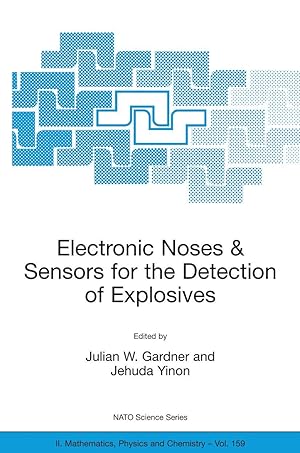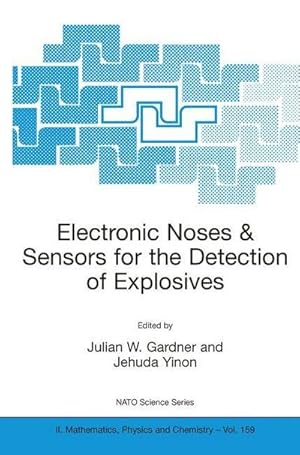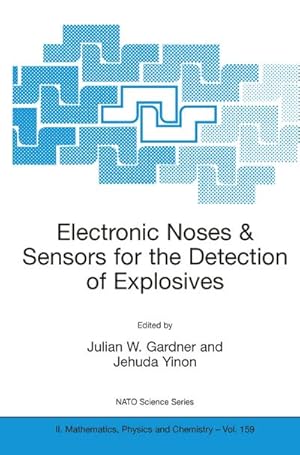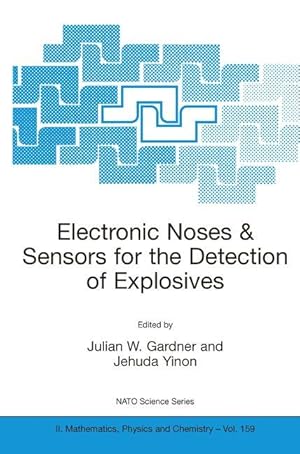explosives detection sensors electronic (28 resultados)
Filtros de búsqueda
Tipo de artículo
- Todos los tipos de productos
- Libros (28)
- Revistas y publicaciones (No hay ningún otro resultado que coincida con este filtro.)
- Cómics (No hay ningún otro resultado que coincida con este filtro.)
- Partituras (No hay ningún otro resultado que coincida con este filtro.)
- Arte, grabados y pósters (No hay ningún otro resultado que coincida con este filtro.)
- Fotografías (No hay ningún otro resultado que coincida con este filtro.)
- Mapas (No hay ningún otro resultado que coincida con este filtro.)
- Manuscritos y coleccionismo de papel (No hay ningún otro resultado que coincida con este filtro.)
Condición Más información
- Nuevo (25)
- Como nuevo, Excelente o Muy bueno (1)
- Bueno o Aceptable (2)
- Regular o Pobre (No hay ningún otro resultado que coincida con este filtro.)
- Tal como se indica (No hay ningún otro resultado que coincida con este filtro.)
Encuadernación
Más atributos
- Primera edición (No hay ningún otro resultado que coincida con este filtro.)
- Firmado (No hay ningún otro resultado que coincida con este filtro.)
- Sobrecubierta (No hay ningún otro resultado que coincida con este filtro.)
- Con imágenes (10)
- No impresión bajo demanda (20)
Idioma (1)
Precio
- Cualquier precio
- Menos de EUR 20 (No hay ningún otro resultado que coincida con este filtro.)
- EUR 20 a EUR 45 (No hay ningún otro resultado que coincida con este filtro.)
- Más de EUR 45
Gastos de envío gratis
- Envío gratis a Estados Unidos de America (No hay ningún otro resultado que coincida con este filtro.)
Ubicación del vendedor
Valoración de los vendedores
-
Electronic Noses & Sensors for the Detection of Explosives (NATO Science Series II: Mathematics, Physics and Chemistry, 159)
Libro 241 de 241: NATO Science Series II: Mathematics, Physics and ChemistryLibrería: Zubal-Books, Since 1961, Cleveland, OH, Estados Unidos de America
EUR 87,23
EUR 3,88 gastos de envío en Estados Unidos de AmericaCantidad disponible: 1 disponibles
Añadir al carritoCondición: New. *Price HAS BEEN REDUCED by 10% until Monday, Dec. 1 (SALE item)* 326 pp., paperback, NEW!! - If you are reading this, this item is actually (physically) in our stock and ready for shipment once ordered. We are not bookjackers. Buyer is responsible for any additional duties, taxes, or fees required by recipient's country.
-
Electronic Noses & Sensors for the Detection of Explosives (NATO Science Series II: Mathematics, Physics and Chemistry, 159)
Libro 241 de 241: NATO Science Series II: Mathematics, Physics and ChemistryLibrería: Phatpocket Limited, Waltham Abbey, HERTS, Reino Unido
EUR 133,56
EUR 12,14 gastos de envío desde Reino Unido a Estados Unidos de AmericaCantidad disponible: 1 disponibles
Añadir al carritoCondición: Good. Your purchase helps support Sri Lankan Children's Charity 'The Rainbow Centre'. Ex-library, so some stamps and wear, but in good overall condition. Our donations to The Rainbow Centre have helped provide an education and a safe haven to hundreds of children who live in appalling conditions.
-
Explosives Detection: Sensors, Electronic Systems and Data Processing (NATO Science for Peace and Security Series B: Physics and Biophysics)
Libro 29 de 32: NATO Science for Peace and Security Series B: Physics and BiophysicsLibrería: Lucky's Textbooks, Dallas, TX, Estados Unidos de America
EUR 158,51
EUR 3,44 gastos de envío en Estados Unidos de AmericaCantidad disponible: Más de 20 disponibles
Añadir al carritoCondición: New.
-
Explosives Detection: Sensors, Electronic Systems and Data Processing (NATO Science for Peace and Security Series B: Physics and Biophysics)
Libro 29 de 32: NATO Science for Peace and Security Series B: Physics and BiophysicsLibrería: Lucky's Textbooks, Dallas, TX, Estados Unidos de America
EUR 158,91
EUR 3,44 gastos de envío en Estados Unidos de AmericaCantidad disponible: Más de 20 disponibles
Añadir al carritoCondición: New.
-
Explosives Detection: Sensors, Electronic Systems and Data Processing (NATO Science for Peace and Security Series B: Physics and Biophysics)
Libro 29 de 32: NATO Science for Peace and Security Series B: Physics and BiophysicsLibrería: Ria Christie Collections, Uxbridge, Reino Unido
EUR 157,61
EUR 13,67 gastos de envío desde Reino Unido a Estados Unidos de AmericaCantidad disponible: Más de 20 disponibles
Añadir al carritoCondición: New. In.
-
Explosives Detection: Sensors, Electronic Systems and Data Processing (NATO Science for Peace and Security Series B: Physics and Biophysics)
Libro 29 de 32: NATO Science for Peace and Security Series B: Physics and BiophysicsLibrería: Ria Christie Collections, Uxbridge, Reino Unido
EUR 163,60
EUR 13,67 gastos de envío desde Reino Unido a Estados Unidos de AmericaCantidad disponible: Más de 20 disponibles
Añadir al carritoCondición: New. In.
-
Explosives Detection: Sensors, Electronic Systems and Data Processing (NATO Science for Peace and Security Series B: Physics and Biophysics)
Libro 29 de 32: NATO Science for Peace and Security Series B: Physics and BiophysicsLibrería: Books Puddle, New York, NY, Estados Unidos de America
EUR 191,08
EUR 3,44 gastos de envío en Estados Unidos de AmericaCantidad disponible: 4 disponibles
Añadir al carritoCondición: New.
-
Explosives Detection: Sensors, Electronic Systems and Data Processing (NATO Science for Peace and Security Series B: Physics and Biophysics)
Libro 29 de 32: NATO Science for Peace and Security Series B: Physics and BiophysicsLibrería: Books Puddle, New York, NY, Estados Unidos de America
EUR 203,38
EUR 3,44 gastos de envío en Estados Unidos de AmericaCantidad disponible: 4 disponibles
Añadir al carritoCondición: New. pp. 344.
-
Explosives Detection | Sensors, Electronic Systems and Data Processing
Libro 29 de 32: NATO Science for Peace and Security Series B: Physics and BiophysicsLibrería: preigu, Osnabrück, Alemania
EUR 141,90
EUR 70,00 gastos de envío desde Alemania a Estados Unidos de AmericaCantidad disponible: 5 disponibles
Añadir al carritoTaschenbuch. Condición: Neu. Explosives Detection | Sensors, Electronic Systems and Data Processing | Lorenzo Capineri (u. a.) | Taschenbuch | xiii | Englisch | 2021 | Springer | EAN 9789402417319 | Verantwortliche Person für die EU: Springer Verlag GmbH, Tiergartenstr. 17, 69121 Heidelberg, juergen[dot]hartmann[at]springer[dot]com | Anbieter: preigu.
-
Explosives Detection : Sensors, Electronic Systems and Data Processing
Libro 29 de 32: NATO Science for Peace and Security Series B: Physics and BiophysicsLibrería: AHA-BUCH GmbH, Einbeck, Alemania
EUR 166,62
EUR 62,64 gastos de envío desde Alemania a Estados Unidos de AmericaCantidad disponible: 1 disponibles
Añadir al carritoTaschenbuch. Condición: Neu. Druck auf Anfrage Neuware - Printed after ordering - This volume presents selected contributions from the 'Advanced Research Workshop on Explosives Detection' hosted by the Department of Information Engineering of the University of Florence, Italy in 2018. The main goal of the workshop was to find out how Science for Peace and Security projects in the field of Explosives Detection contribute to the development and/or refinement of scientific and technical knowledge and competencies. The findings of the workshop, presented in the last section of the book, determine future actions and direction of the SPS Programme in the field of explosives detection and management.The NATO Science for Peace and Security (SPS) Programme, promotes dialogue and practical cooperation between NATO member states and partner nations based on scientific research, technological innovation and knowledge exchange. Several initiatives were launched in the field of explosive detection and clearance, as part of NATO's enhanced role in the international fight against terrorism. Experts and scientists from NATO members and partner countries have been brought together in multi-year projects, within the framework of the SPS Programme, to cooperate in the scientific research in explosive detection field, developing new technologies and methods to be implemented in order to detect explosive substances in different contexts.
-
Explosives Detection : Sensors, Electronic Systems and Data Processing
Libro 29 de 32: NATO Science for Peace and Security Series B: Physics and BiophysicsPublicado por Springer Netherlands, Springer Netherlands, 2020
ISBN 10: 9402417281 ISBN 13: 9789402417289
Idioma: Inglés
Librería: AHA-BUCH GmbH, Einbeck, Alemania
EUR 166,62
EUR 63,44 gastos de envío desde Alemania a Estados Unidos de AmericaCantidad disponible: 1 disponibles
Añadir al carritoBuch. Condición: Neu. Druck auf Anfrage Neuware - Printed after ordering - This volume presents selected contributions from the 'Advanced Research Workshop on Explosives Detection' hosted by the Department of Information Engineering of the University of Florence, Italy in 2018. The main goal of the workshop was to find out how Science for Peace and Security projects in the field of Explosives Detection contribute to the development and/or refinement of scientific and technical knowledge and competencies. The findings of the workshop, presented in the last section of the book, determine future actions and direction of the SPS Programme in the field of explosives detection and management.The NATO Science for Peace and Security (SPS) Programme, promotes dialogue and practical cooperation between NATO member states and partner nations based on scientific research, technological innovation and knowledge exchange. Several initiatives were launched in the field of explosive detection and clearance, as part of NATO's enhanced role in the international fight against terrorism. Experts and scientists from NATO members and partner countries have been brought together in multi-year projects, within the framework of the SPS Programme, to cooperate in the scientific research in explosive detection field, developing new technologies and methods to be implemented in order to detect explosive substances in different contexts.
-
Explosives Detection: Sensors, Electronic Systems and Data Processing
Libro 29 de 32: NATO Science for Peace and Security Series B: Physics and BiophysicsLibrería: Revaluation Books, Exeter, Reino Unido
EUR 233,59
EUR 11,41 gastos de envío desde Reino Unido a Estados Unidos de AmericaCantidad disponible: 2 disponibles
Añadir al carritoPaperback. Condición: Brand New. 344 pages. 9.25x6.10x0.82 inches. In Stock.
-
Explosives Detection: Sensors, Electronic Systems and Data Processing
Libro 29 de 32: NATO Science for Peace and Security Series B: Physics and BiophysicsLibrería: Revaluation Books, Exeter, Reino Unido
EUR 235,61
EUR 14,26 gastos de envío desde Reino Unido a Estados Unidos de AmericaCantidad disponible: 2 disponibles
Añadir al carritoHardcover. Condición: Brand New. 348 pages. 9.25x6.10x0.94 inches. In Stock.
-
Electronic Noses & Sensors for the Detection of Explosives (NATO Science Series II: Mathematics, Physics and Chemistry, 159)
Libro 241 de 241: NATO Science Series II: Mathematics, Physics and ChemistryLibrería: HPB-Red, Dallas, TX, Estados Unidos de America
EUR 274,82
EUR 3,23 gastos de envío en Estados Unidos de AmericaCantidad disponible: 1 disponibles
Añadir al carritopaperback. Condición: Good. Connecting readers with great books since 1972! Used textbooks may not include companion materials such as access codes, etc. May have some wear or writing/highlighting. We ship orders daily and Customer Service is our top priority!
-
Electronic Noses and Sensors for the Detection of Explosives (Nato Science Series II: Mathematics, Physics and Chemistry)
Libro 241 de 241: NATO Science Series II: Mathematics, Physics and ChemistryLibrería: Mispah books, Redhill, SURRE, Reino Unido
EUR 278,49
EUR 28,52 gastos de envío desde Reino Unido a Estados Unidos de AmericaCantidad disponible: 1 disponibles
Añadir al carritoPaperback. Condición: Like New. Like New. book.
-
Electronic Noses & Sensors for the Detection of Explosives (NATO Science Series II: Mathematics, Physics and Chemistry, 159)
Libro 241 de 241: NATO Science Series II: Mathematics, Physics and ChemistryLibrería: Ria Christie Collections, Uxbridge, Reino Unido
EUR 298,62
EUR 13,67 gastos de envío desde Reino Unido a Estados Unidos de AmericaCantidad disponible: Más de 20 disponibles
Añadir al carritoCondición: New. In.
-
Electronic Noses & Sensors for the Detection of Explosives (NATO Science Series II: Mathematics, Physics and Chemistry, 159)
Libro 241 de 241: NATO Science Series II: Mathematics, Physics and ChemistryLibrería: Ria Christie Collections, Uxbridge, Reino Unido
EUR 298,62
EUR 13,67 gastos de envío desde Reino Unido a Estados Unidos de AmericaCantidad disponible: Más de 20 disponibles
Añadir al carritoCondición: New. In.
-
Electronic Noses & Sensors for the Detection of Explosives
Libro 241 de 241: NATO Science Series II: Mathematics, Physics and ChemistryLibrería: moluna, Greven, Alemania
EUR 336,82
EUR 48,99 gastos de envío desde Alemania a Estados Unidos de AmericaCantidad disponible: Más de 20 disponibles
Añadir al carritoCondición: New. Proceedings of the NATO Advanced Research Workshop, held in Warwick, Coventry, U.K., 30 September-3 October 2003 This book examines both the potential application of electronic nose technology, and the current state of development of chemical sensors.
-
Electronic Noses & Sensors for the Detection of Explosives
Libro 241 de 241: NATO Science Series II: Mathematics, Physics and ChemistryPublicado por Springer Netherlands, Springer Netherlands, 2004
ISBN 10: 1402023189 ISBN 13: 9781402023187
Idioma: Inglés
Librería: AHA-BUCH GmbH, Einbeck, Alemania
EUR 331,86
EUR 62,50 gastos de envío desde Alemania a Estados Unidos de AmericaCantidad disponible: 1 disponibles
Añadir al carritoTaschenbuch. Condición: Neu. Druck auf Anfrage Neuware - Printed after ordering - This book examines both the potential application of electronic nose technology, and the current state of development of chemical sensors for the detection of vapours from explosives, such as those used in landmines. The two fields have developed, somewhat in parallel, over the past decade and so one of the purposes of this workshop, on which the book is based, was to bring together scientists from the two fields in order to challenge the two communities and, mutually, stimulate both fields.It begins with a review of the basic principles of an electronic nose and explores possible ways in which the detection limit of conventional electronic nose technology can be reduced to the level required for the trace levels observed for many explosive materials. Next are reviews of the use of several different types of solid-state chemical sensors: polymer-based sensors, i.e. chemiluminescent, fluorescent and optical, to detect explosive materials; metal oxide semiconducting resistive sensors; and then electrochemical sensors. Next, different pattern recognition techniques are presented to enhance the performance of chemical sensors. Then biological systems are considered as a possible blue-print for chemical sensing. The biology can be employed either to understand the way insects locate odorant sources, or to understand the signal processing neural pathways. Next is a discussion of some of the new types of electronic noses; namely, a fast GC column with a SAW detector and a micromechanical sensor. Finally, the important issues of sampling technologies and the design of the microfluidic systems are considered. In particular, the use of pre-concentrators and solid phase micro extractors to boost the vapour concentration before it is introduced to the chemical sensor or electronic nose.
-
Electronic Noses & Sensors for the Detection of Explosives
Libro 241 de 241: NATO Science Series II: Mathematics, Physics and ChemistryLibrería: AHA-BUCH GmbH, Einbeck, Alemania
EUR 474,63
EUR 63,15 gastos de envío desde Alemania a Estados Unidos de AmericaCantidad disponible: 2 disponibles
Añadir al carritoBuch. Condición: Neu. Neuware - This book examines both the potential application of electronic nose technology, and the current state of development of chemical sensors for the detection of vapours from explosives, such as those used in landmines. The two fields have developed, somewhat in parallel, over the past decade and so one of the purposes of this workshop, on which the book is based, was to bring together scientists from the two fields in order to challenge the two communities and, mutually, stimulate both fields.It begins with a review of the basic principles of an electronic nose and explores possible ways in which the detection limit of conventional electronic nose technology can be reduced to the level required for the trace levels observed for many explosive materials. Next are reviews of the use of several different types of solid-state chemical sensors: polymer-based sensors, i.e. chemiluminescent, fluorescent and optical, to detect explosive materials; metal oxide semiconducting resistive sensors; and then electrochemical sensors. Next, different pattern recognition techniques are presented to enhance the performance of chemical sensors. Then biological systems are considered as a possible blue-print for chemical sensing. The biology can be employed either to understand the way insects locate odorant sources, or to understand the signal processing neural pathways. Next is a discussion of some of the new types of electronic noses; namely, a fast GC column with a SAW detector and a micromechanical sensor. Finally, the important issues of sampling technologies and the design of the microfluidic systems are considered. In particular, the use of pre-concentrators and solid phase micro extractors to boost the vapour concentration before it is introduced to the chemical sensor or electronic nose.
-
Electronic Noses & Sensors for the Detection of Explosives
Libro 241 de 241: NATO Science Series II: Mathematics, Physics and ChemistryPublicado por Springer Netherlands Aug 2004, 2004
ISBN 10: 1402023189 ISBN 13: 9781402023187
Idioma: Inglés
Librería: BuchWeltWeit Ludwig Meier e.K., Bergisch Gladbach, Alemania
EUR 112,34
EUR 23,00 gastos de envío desde Alemania a Estados Unidos de AmericaCantidad disponible: 2 disponibles
Añadir al carritoTaschenbuch. Condición: Neu. This item is printed on demand - it takes 3-4 days longer - Neuware -This book examines both the potential application of electronic nose technology, and the current state of development of chemical sensors for the detection of vapours from explosives, such as those used in landmines. The two fields have developed, somewhat in parallel, over the past decade and so one of the purposes of this workshop, on which the book is based, was to bring together scientists from the two fields in order to challenge the two communities and, mutually, stimulate both fields.It begins with a review of the basic principles of an electronic nose and explores possible ways in which the detection limit of conventional electronic nose technology can be reduced to the level required for the trace levels observed for many explosive materials. Next are reviews of the use of several different types of solid-state chemical sensors: polymer-based sensors, i.e. chemiluminescent, fluorescent and optical, to detect explosive materials; metal oxide semiconducting resistive sensors; and then electrochemical sensors. Next, different pattern recognition techniques are presented to enhance the performance of chemical sensors. Then biological systems are considered as a possible blue-print for chemical sensing. The biology can be employed either to understand the way insects locate odorant sources, or to understand the signal processing neural pathways. Next is a discussion of some of the new types of electronic noses; namely, a fast GC column with a SAW detector and a micromechanical sensor. Finally, the important issues of sampling technologies and the design of the microfluidic systems are considered. In particular, the use of pre-concentrators and solid phase micro extractors to boost the vapour concentration before it is introduced to the chemical sensor or electronic nose. 328 pp. Englisch.
-
Explosives Detection: Sensors, Electronic Systems and Data Processing (NATO Science for Peace and Security Series B: Physics and Biophysics)
Libro 29 de 32: NATO Science for Peace and Security Series B: Physics and BiophysicsLibrería: Majestic Books, Hounslow, Reino Unido
EUR 204,01
EUR 7,42 gastos de envío desde Reino Unido a Estados Unidos de AmericaCantidad disponible: 4 disponibles
Añadir al carritoCondición: New. Print on Demand.
-
Explosives Detection | Sensors, Electronic Systems and Data Processing
Libro 29 de 32: NATO Science for Peace and Security Series B: Physics and BiophysicsLibrería: preigu, Osnabrück, Alemania
EUR 141,90
EUR 70,00 gastos de envío desde Alemania a Estados Unidos de AmericaCantidad disponible: 5 disponibles
Añadir al carritoBuch. Condición: Neu. Explosives Detection | Sensors, Electronic Systems and Data Processing | Lorenzo Capineri (u. a.) | Buch | xiii | Englisch | 2020 | Springer | EAN 9789402417289 | Verantwortliche Person für die EU: Springer Verlag GmbH, Tiergartenstr. 17, 69121 Heidelberg, juergen[dot]hartmann[at]springer[dot]com | Anbieter: preigu Print on Demand.
-
Explosives Detection: Sensors, Electronic Systems and Data Processing (NATO Science for Peace and Security Series B: Physics and Biophysics)
Libro 29 de 32: NATO Science for Peace and Security Series B: Physics and BiophysicsLibrería: Biblios, Frankfurt am main, HESSE, Alemania
EUR 204,66
EUR 9,95 gastos de envío desde Alemania a Estados Unidos de AmericaCantidad disponible: 4 disponibles
Añadir al carritoCondición: New. PRINT ON DEMAND.
-
Explosives Detection: Sensors, Electronic Systems and Data Processing (NATO Science for Peace and Security Series B: Physics and Biophysics)
Libro 29 de 32: NATO Science for Peace and Security Series B: Physics and BiophysicsLibrería: Majestic Books, Hounslow, Reino Unido
EUR 218,34
EUR 7,42 gastos de envío desde Reino Unido a Estados Unidos de AmericaCantidad disponible: 4 disponibles
Añadir al carritoCondición: New. Print on Demand pp. 344.
-
Explosives Detection: Sensors, Electronic Systems and Data Processing (NATO Science for Peace and Security Series B: Physics and Biophysics)
Libro 29 de 32: NATO Science for Peace and Security Series B: Physics and BiophysicsLibrería: Biblios, Frankfurt am main, HESSE, Alemania
EUR 218,99
EUR 9,95 gastos de envío desde Alemania a Estados Unidos de AmericaCantidad disponible: 4 disponibles
Añadir al carritoCondición: New. PRINT ON DEMAND pp. 344.
-
Electronic Noses & Sensors for the Detection of Explosives
Libro 241 de 241: NATO Science Series II: Mathematics, Physics and ChemistryLibrería: moluna, Greven, Alemania
EUR 267,86
EUR 48,99 gastos de envío desde Alemania a Estados Unidos de AmericaCantidad disponible: Más de 20 disponibles
Añadir al carritoCondición: New. Dieser Artikel ist ein Print on Demand Artikel und wird nach Ihrer Bestellung fuer Sie gedruckt. Proceedings of the NATO Advanced Research Workshop, held in Warwick, Coventry, U.K., 30 September-3 October 2003 This book examines both the potential application of electronic nose technology, and the current state of development of chemical sensors.
-
Electronic Noses & Sensors for the Detection of Explosives
Libro 241 de 241: NATO Science Series II: Mathematics, Physics and ChemistryPublicado por Springer Netherlands, Springer Netherlands Aug 2004, 2004
ISBN 10: 1402023189 ISBN 13: 9781402023187
Idioma: Inglés
Librería: buchversandmimpf2000, Emtmannsberg, BAYE, Alemania
EUR 320,99
EUR 60,00 gastos de envío desde Alemania a Estados Unidos de AmericaCantidad disponible: 1 disponibles
Añadir al carritoTaschenbuch. Condición: Neu. This item is printed on demand - Print on Demand Titel. Neuware -This book examines both the potential application of electronic nose technology, and the current state of development of chemical sensors for the detection of vapours from explosives, such as those used in landmines. The two fields have developed, somewhat in parallel, over the past decade and so one of the purposes of this workshop, on which the book is based, was to bring together scientists from the two fields in order to challenge the two communities and, mutually, stimulate both fields. It begins with a review of the basic principles of an electronic nose and explores possible ways in which the detection limit of conventional electronic nose technology can be reduced to the level required for the trace levels observed for many explosive materials. Next are reviews of the use of several different types of solid-state chemical sensors: polymer-based sensors, i.e. chemiluminescent, fluorescent and optical, to detect explosive materials; metal oxide semiconducting resistive sensors; and then electrochemical sensors. Next, different pattern recognition techniques are presented to enhance the performance of chemical sensors. Then biological systems are considered as a possible blue-print for chemical sensing. The biology can be employed either to understand the way insects locate odorant sources, or to understand the signal processing neural pathways. Next is a discussion of some of the new types of electronic noses; namely, a fast GC column with a SAW detector and a micromechanical sensor. Finally, the important issues of sampling technologies and the design of the microfluidic systems are considered. In particular, the use of pre-concentrators and solid phase micro extractors to boost the vapour concentration before it is introduced to the chemical sensor or electronic nose.Springer Verlag GmbH, Tiergartenstr. 17, 69121 Heidelberg 328 pp. Englisch.















